Unit 8 lesson 4 [下学期]
文档属性
| 名称 | Unit 8 lesson 4 [下学期] | 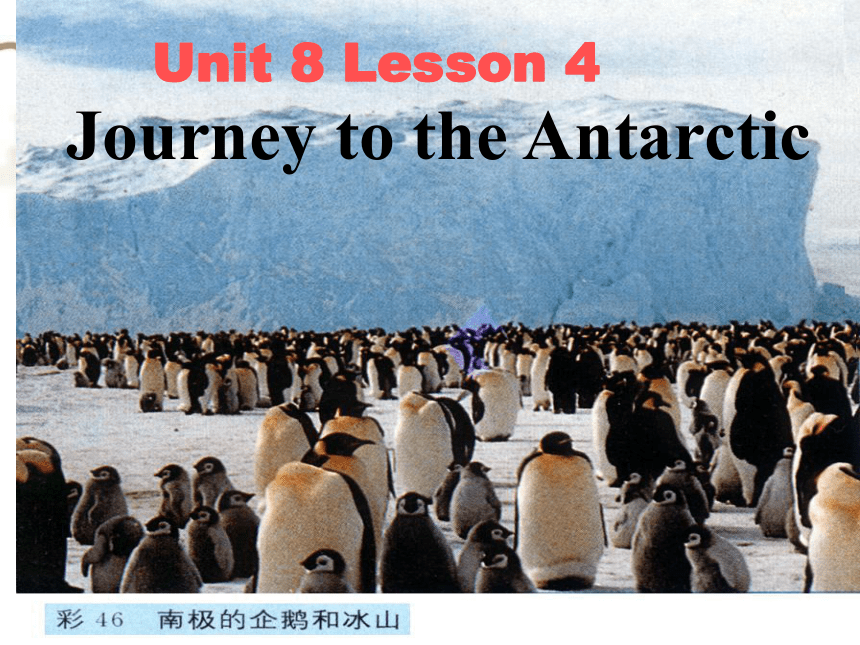 | |
| 格式 | rar | ||
| 文件大小 | 937.5KB | ||
| 资源类型 | 教案 | ||
| 版本资源 | 北师大版 | ||
| 科目 | 英语 | ||
| 更新时间 | 2006-04-17 13:55:00 | ||
图片预览

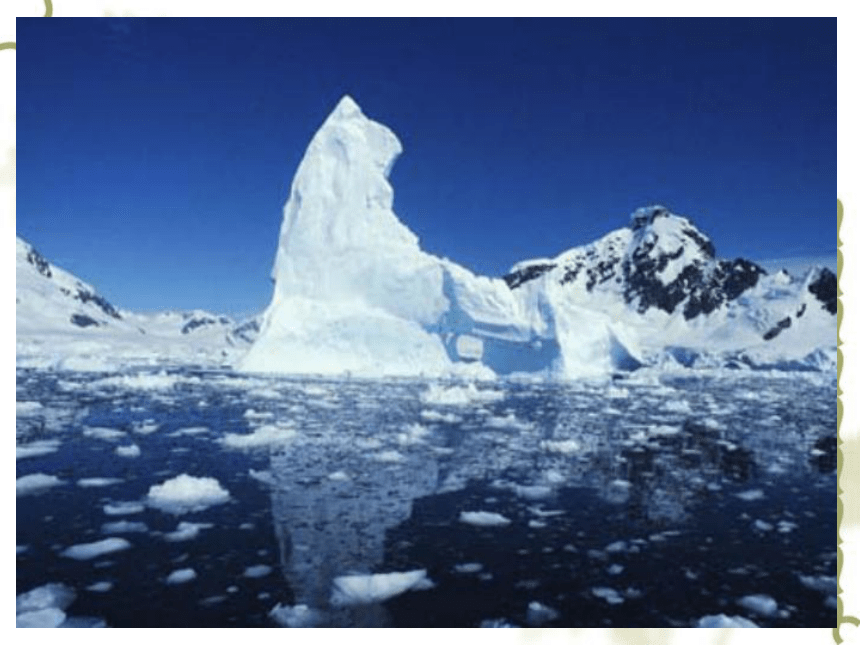
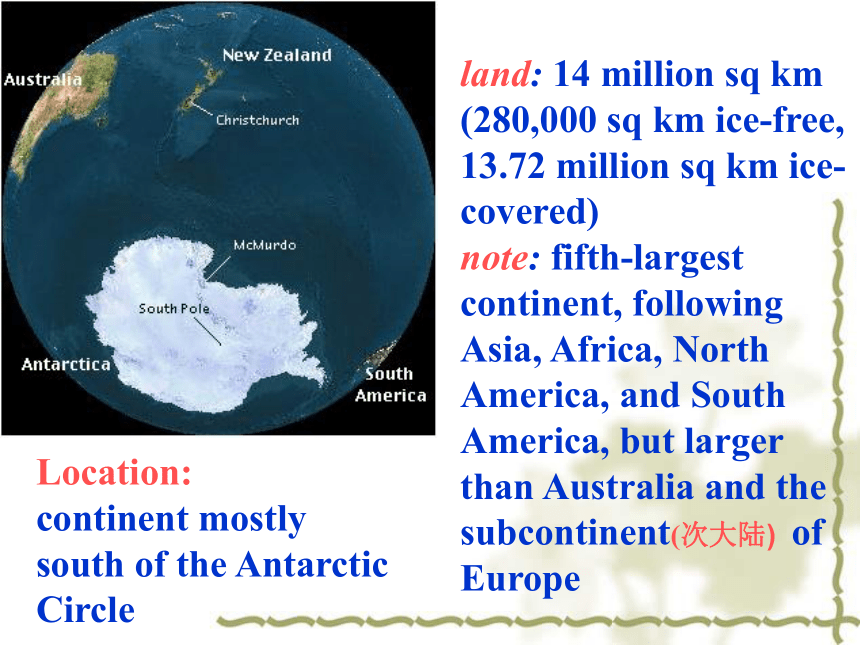
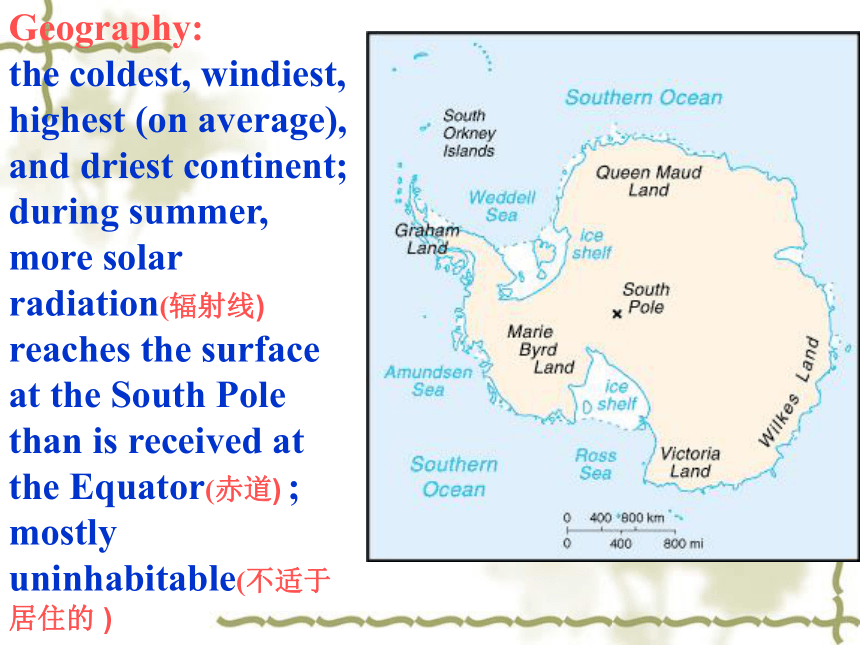
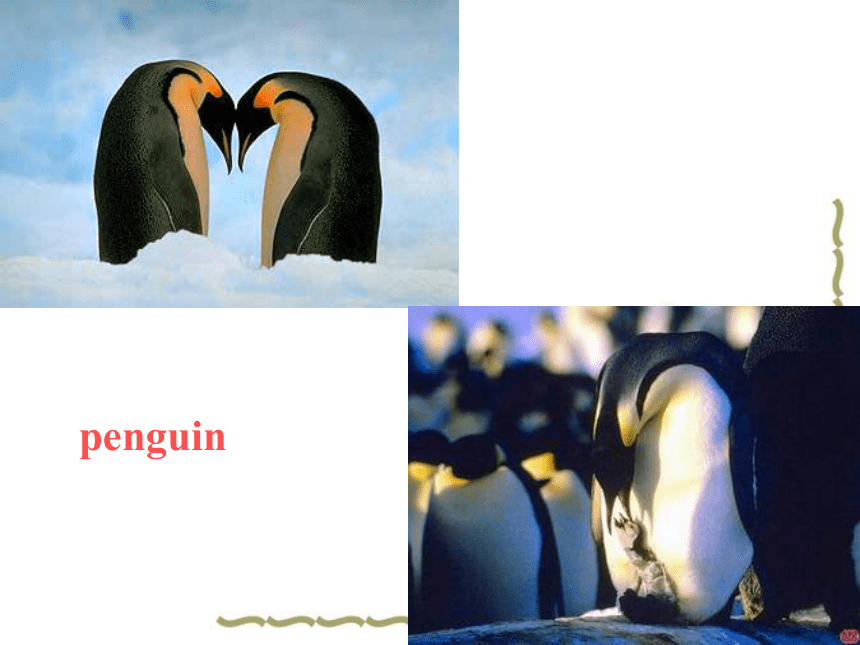
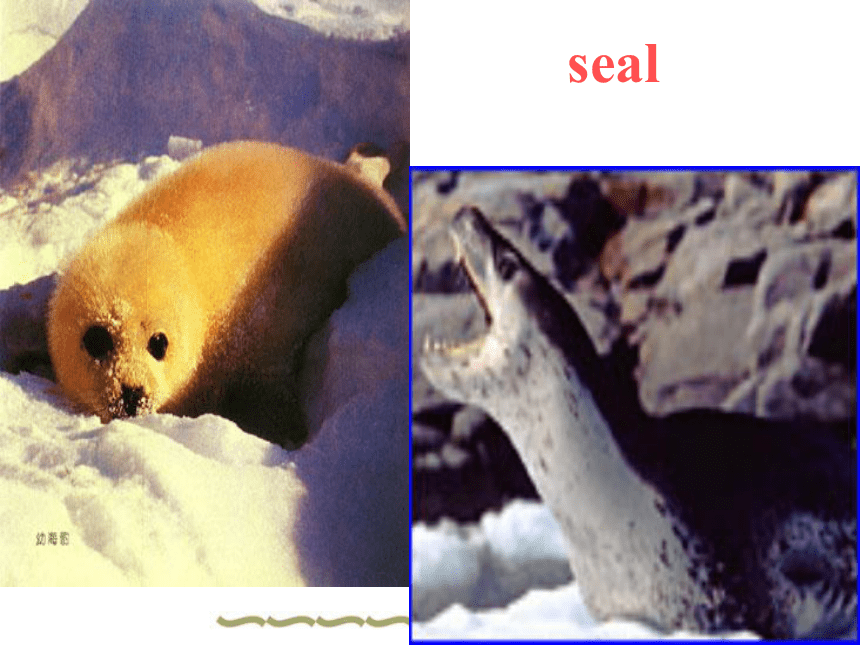
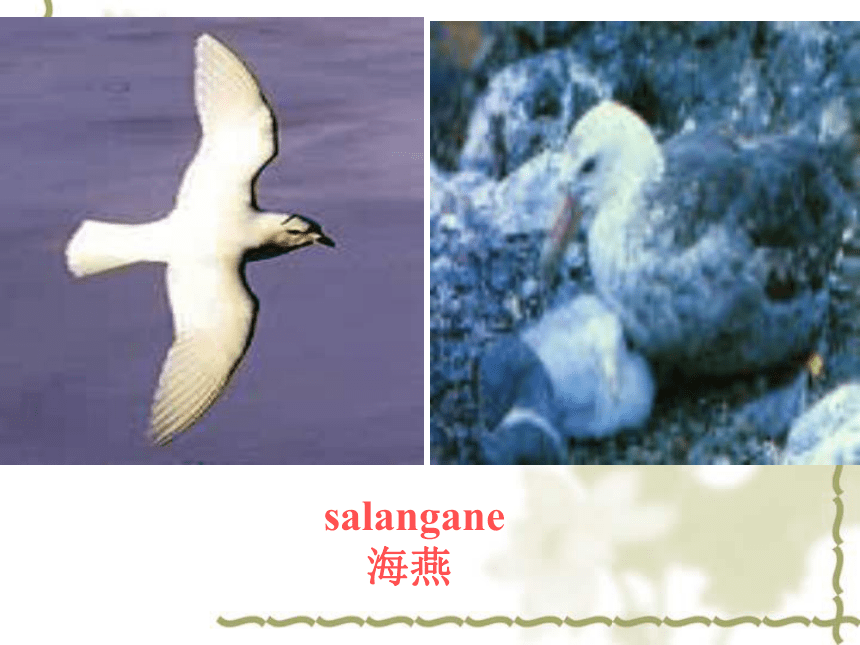
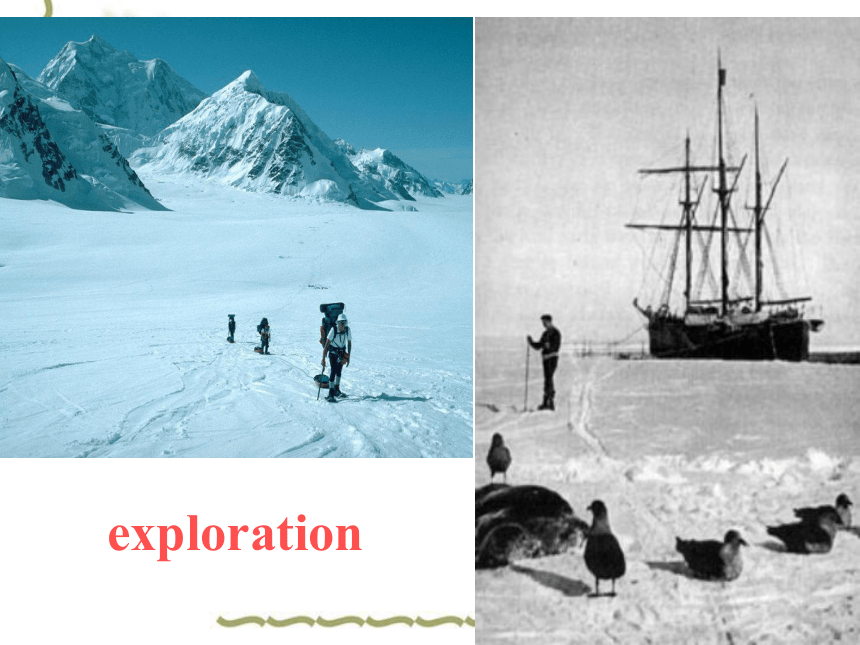
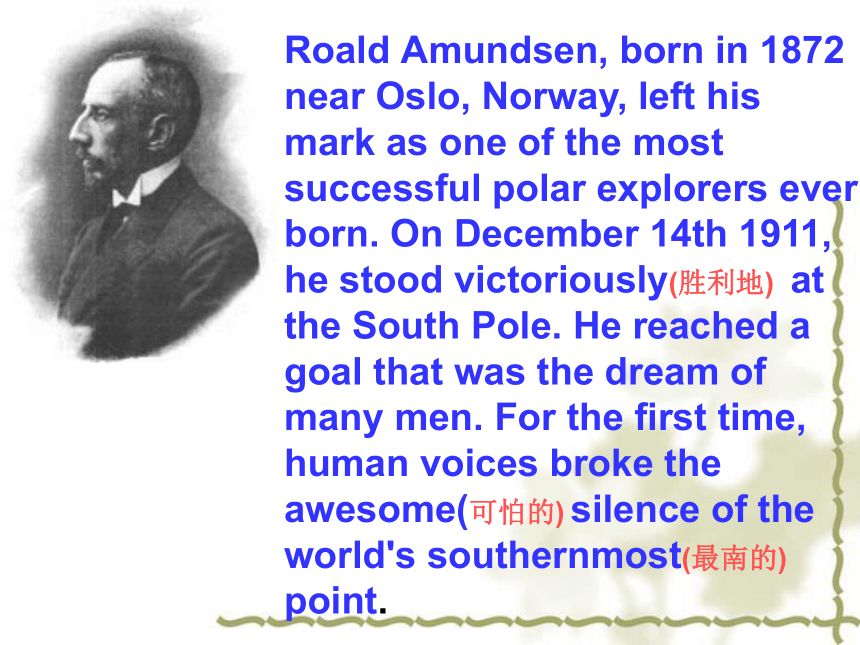

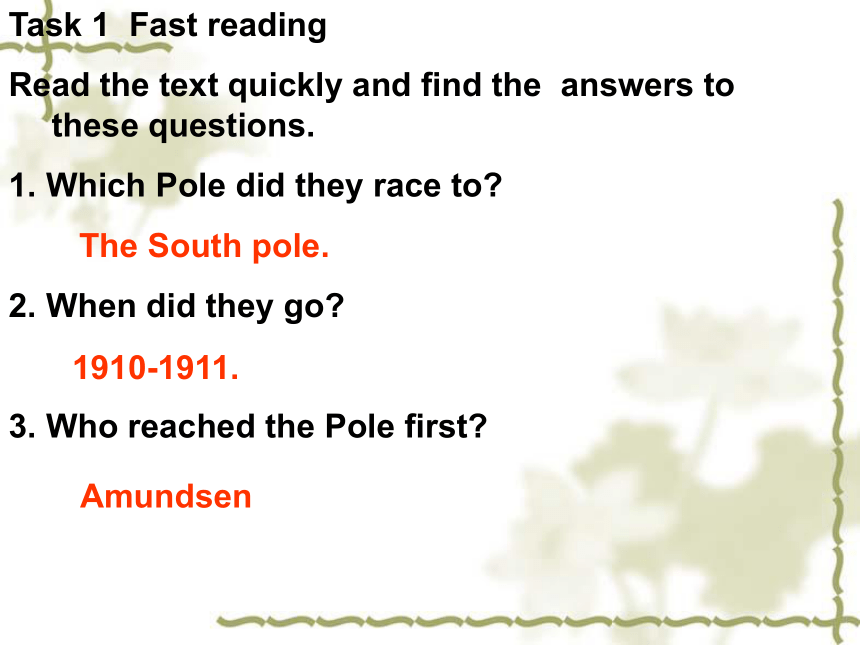
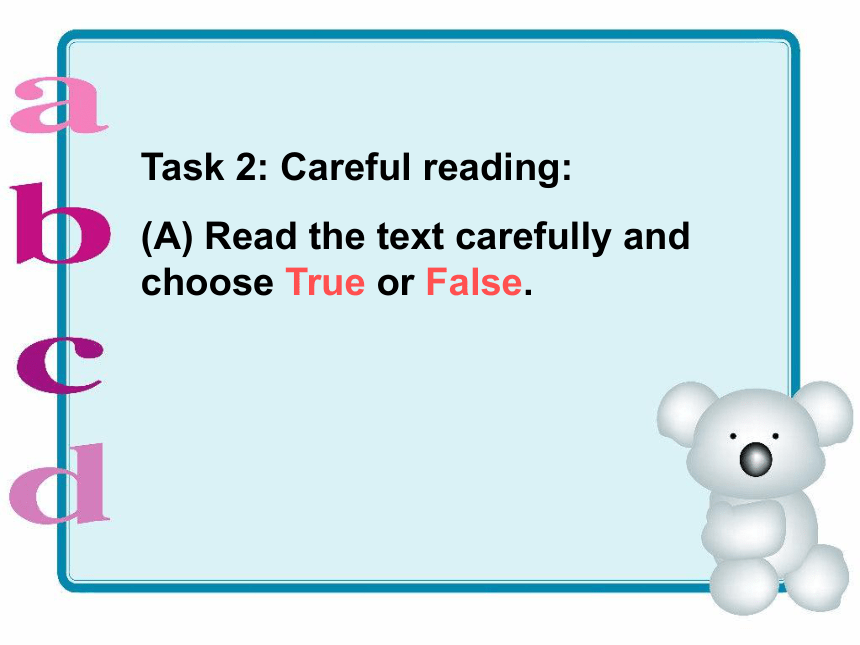
文档简介
课件31张PPT。 Unit 8 Lesson 4
Journey to the Antarctic land: 14 million sq km (280,000 sq km ice-free, 13.72 million sq km ice-covered) note: fifth-largest continent, following Asia, Africa, North America, and South America, but larger than Australia and the subcontinent(次大陆) of Europe
Location: continent mostly south of the Antarctic Circle
Geography: the coldest, windiest, highest (on average), and driest continent; during summer, more solar radiation(辐射线) reaches the surface at the South Pole than is received at the Equator(赤道) ; mostly uninhabitable(不适于居住的 )
penguinsealsalangane
海燕explorationRoald Amundsen, born in 1872 near Oslo, Norway, left his mark as one of the most successful polar explorers ever born. On December 14th 1911, he stood victoriously(胜利地) at the South Pole. He reached a goal that was the dream of many men. For the first time, human voices broke the awesome(可怕的) silence of the world's southernmost(最南的) point.
Robert Falcon Scott was born at Outlands on June 6, 1868. He had a race with Roald Amunsden to the South Pole, and he and his four companions(同伴) arrived one month later thanScott. But unfortunately,on their way back, all of them died of hunger and extremely cold.
L to R: Wilson, Evans, Scott, Oates and Bowers Task 1 Fast reading
Read the text quickly and find the answers to these questions.
1. Which Pole did they race to?
2. When did they go?
3. Who reached the Pole first?
The South pole. 1910-1911. Amundsen Task 2: Careful reading:
(A) Read the text carefully and choose True or False.
1. Scott and Amundsen started their journeys in the polar spring.
2. Scott’s use of sledges and horses was a success.
3. Amundsen travelled more quickly than Scott.
4. When they got to the Pole, Scott’s team had a celebration.
5. Captain Oates went for a walk and died in a storm.
6. Scott’s last letter was to his wife.
( T )
( F )( F )( T)( T )( T )( B ) Answer these questions according to the text.
1. Why did Amundsen succeed and Scott fail?
2. What did Scott’s team achieve?
Amundsen succeeded because he made rapid progress because he had teams of dogs pulling the sledges and his men were on skis.They reached the Pole although they didn’t win the race and they became heroes because of their courage. They collected rocks that proved Antarctica had once been covered by plants.3. Why did Scott and his men become heroes?
4. How did you feel after you read the story?
They became heroes because although they died on the return journey, they showed extraordinary courage all the time.
Language points of the text 1.Then he prepared for the return journey.
prepare for… 为…而准备…
Hope for the best and prepare for the worst.
Please prepare a table for dinner.
We must prepare the room for the meeting. 我们必须为会议准备好房间。
…,both teams organised food bases in preparation for their journeys the next year.
preparation n.
You cannot pass an examination without preparation. 你不准备就不可能通过考试。
in preparation for getting ready for something为…作准备
He packed his bags in preparation for the journey. 他打好提包,为旅行作准备。
in preparation 在准备中
The book is still in preparation. 书仍在编写中。
2.Because of this, he made rapid progress.
progress n. moving forward 前进
make progress in/with sth.
progress n. getting better 进步;进展
He made no progress in learning to write. 他在学习写作方面没有进步。
Are you making any progress with your study?
Have you made rapid progress since you entered school? 进学校以来你进步快吗?
3. break down go wrong and stop working出毛病;不运转
· The machine broke down. 机器坏了。
· Then the car I was in broke down. 这时我乘坐的汽车坏了。
stop; pause 中断
· The conversation broke down at this point.
这时候谈话中断了。
break in 蹩脚英语
break in on/upon 非法进入,强行进入
break out 使人心碎
break one’s heart 爆发,突然讲出
broken English 打搅,使停顿4. The next to go was Caption Oats, who was having great difficulty walking.
have difficulty/problem with sth.
have difficulty/problem (in) doing sth.
I don’t have much difficulty with English grammar.
I once asked him if he had any difficulty in keeping five children in school. 有一次我问他供五个孩子上学是否有什么困难。
· I had a great deal of difficulty in reading the text.
5. spend
sb. spend …on sth.
sb. spend … (in) doing sth.
e.g. He doesn’t spend much time on his homework.
He spent much time correcting my grammar.6. He had failed to win the race to the Pole, ...
fail vi. 失败
e.g. All our plans failed.
fail in sth. 在…不足,在…失败.
e.g. He has failed in his mathematics.
She failed in her last English exam.
fail to do sth. 没有能够,没有
e.g. He fails to understand its real significance.
When I failed to find you ,I sent you a note by messenger(通信员).7.The men were soon exhausted and were running out of food.
be exhausted (by/with /from)adj. [因…而]疲惫的,筋疲力竭的
We were exhausted by the climb up the hill. 我们因爬上那座小山而筋疲力竭。
We were [felt] quite exhausted with the toil. 我们因那件辛苦的工作而感到十分疲惫。 run out of= be used up, finished 用完, 耗尽
The petrol is running out./We are running out of petrol. 汽油快用光了[我们的汽油快用光了].
Our time is running out./We are running out of time. 我们剩下的时间不多了.
run out失效, 过期
My passport has run out. 我的护照已失效.
The lease on our flat runs out in a few months. 我们公寓的租约还有几个月就到期了.
But the extraordinary courage shown by Captain Scott and his men made them into heroes.
Show courage 表现勇敢,表现勇气/胆识
He showed great courage in battle. 他在战斗中表现得十分勇敢.
Trevor showed great courage when he saved the child from the burning house.
特里弗在烈火中把孩子从屋里抢救出来时表现得非常英勇。
lose courage 失去勇气
recover (=regain) courage 恢复勇气
summon up courage 一鼓作气
拉雪橇 pull the sledge
推雪橇 push the sledge
过去;曾经 at one time
失去目标 lose the goal
抽时间 find time
筋疲力竭 be exhausted
在遥远的过去 in the distant past
生病 have a disease
继续;进行;经营 carry on
开始,进行 be on
遇到麻烦 have problems
走向死亡 walk to one’s death
勇敢者的举动 the act of a brave man
使某人成为英雄 make sb into a hero
赢得南极的比赛 win the race to the pole
以…结束生命 meet the end with Match Column A with Column B. sledge
break down
run out of
ambition
hopeless
cheerful
distant
carry on
within
shocked stop functioning
without hope
inside
equipment used for moving on snow
continue
extremely surprised
happy
far away
something you want to achieve
having nothing left
AB Revise the text and the words.
Do Ex.6 on Page 29..HomeworkThank you!
Journey to the Antarctic land: 14 million sq km (280,000 sq km ice-free, 13.72 million sq km ice-covered) note: fifth-largest continent, following Asia, Africa, North America, and South America, but larger than Australia and the subcontinent(次大陆) of Europe
Location: continent mostly south of the Antarctic Circle
Geography: the coldest, windiest, highest (on average), and driest continent; during summer, more solar radiation(辐射线) reaches the surface at the South Pole than is received at the Equator(赤道) ; mostly uninhabitable(不适于居住的 )
penguinsealsalangane
海燕explorationRoald Amundsen, born in 1872 near Oslo, Norway, left his mark as one of the most successful polar explorers ever born. On December 14th 1911, he stood victoriously(胜利地) at the South Pole. He reached a goal that was the dream of many men. For the first time, human voices broke the awesome(可怕的) silence of the world's southernmost(最南的) point.
Robert Falcon Scott was born at Outlands on June 6, 1868. He had a race with Roald Amunsden to the South Pole, and he and his four companions(同伴) arrived one month later thanScott. But unfortunately,on their way back, all of them died of hunger and extremely cold.
L to R: Wilson, Evans, Scott, Oates and Bowers Task 1 Fast reading
Read the text quickly and find the answers to these questions.
1. Which Pole did they race to?
2. When did they go?
3. Who reached the Pole first?
The South pole. 1910-1911. Amundsen Task 2: Careful reading:
(A) Read the text carefully and choose True or False.
1. Scott and Amundsen started their journeys in the polar spring.
2. Scott’s use of sledges and horses was a success.
3. Amundsen travelled more quickly than Scott.
4. When they got to the Pole, Scott’s team had a celebration.
5. Captain Oates went for a walk and died in a storm.
6. Scott’s last letter was to his wife.
( T )
( F )( F )( T)( T )( T )( B ) Answer these questions according to the text.
1. Why did Amundsen succeed and Scott fail?
2. What did Scott’s team achieve?
Amundsen succeeded because he made rapid progress because he had teams of dogs pulling the sledges and his men were on skis.They reached the Pole although they didn’t win the race and they became heroes because of their courage. They collected rocks that proved Antarctica had once been covered by plants.3. Why did Scott and his men become heroes?
4. How did you feel after you read the story?
They became heroes because although they died on the return journey, they showed extraordinary courage all the time.
Language points of the text 1.Then he prepared for the return journey.
prepare for… 为…而准备…
Hope for the best and prepare for the worst.
Please prepare a table for dinner.
We must prepare the room for the meeting. 我们必须为会议准备好房间。
…,both teams organised food bases in preparation for their journeys the next year.
preparation n.
You cannot pass an examination without preparation. 你不准备就不可能通过考试。
in preparation for getting ready for something为…作准备
He packed his bags in preparation for the journey. 他打好提包,为旅行作准备。
in preparation 在准备中
The book is still in preparation. 书仍在编写中。
2.Because of this, he made rapid progress.
progress n. moving forward 前进
make progress in/with sth.
progress n. getting better 进步;进展
He made no progress in learning to write. 他在学习写作方面没有进步。
Are you making any progress with your study?
Have you made rapid progress since you entered school? 进学校以来你进步快吗?
3. break down go wrong and stop working出毛病;不运转
· The machine broke down. 机器坏了。
· Then the car I was in broke down. 这时我乘坐的汽车坏了。
stop; pause 中断
· The conversation broke down at this point.
这时候谈话中断了。
break in 蹩脚英语
break in on/upon 非法进入,强行进入
break out 使人心碎
break one’s heart 爆发,突然讲出
broken English 打搅,使停顿4. The next to go was Caption Oats, who was having great difficulty walking.
have difficulty/problem with sth.
have difficulty/problem (in) doing sth.
I don’t have much difficulty with English grammar.
I once asked him if he had any difficulty in keeping five children in school. 有一次我问他供五个孩子上学是否有什么困难。
· I had a great deal of difficulty in reading the text.
5. spend
sb. spend …on sth.
sb. spend … (in) doing sth.
e.g. He doesn’t spend much time on his homework.
He spent much time correcting my grammar.6. He had failed to win the race to the Pole, ...
fail vi. 失败
e.g. All our plans failed.
fail in sth. 在…不足,在…失败.
e.g. He has failed in his mathematics.
She failed in her last English exam.
fail to do sth. 没有能够,没有
e.g. He fails to understand its real significance.
When I failed to find you ,I sent you a note by messenger(通信员).7.The men were soon exhausted and were running out of food.
be exhausted (by/with /from)adj. [因…而]疲惫的,筋疲力竭的
We were exhausted by the climb up the hill. 我们因爬上那座小山而筋疲力竭。
We were [felt] quite exhausted with the toil. 我们因那件辛苦的工作而感到十分疲惫。 run out of= be used up, finished 用完, 耗尽
The petrol is running out./We are running out of petrol. 汽油快用光了[我们的汽油快用光了].
Our time is running out./We are running out of time. 我们剩下的时间不多了.
run out失效, 过期
My passport has run out. 我的护照已失效.
The lease on our flat runs out in a few months. 我们公寓的租约还有几个月就到期了.
But the extraordinary courage shown by Captain Scott and his men made them into heroes.
Show courage 表现勇敢,表现勇气/胆识
He showed great courage in battle. 他在战斗中表现得十分勇敢.
Trevor showed great courage when he saved the child from the burning house.
特里弗在烈火中把孩子从屋里抢救出来时表现得非常英勇。
lose courage 失去勇气
recover (=regain) courage 恢复勇气
summon up courage 一鼓作气
拉雪橇 pull the sledge
推雪橇 push the sledge
过去;曾经 at one time
失去目标 lose the goal
抽时间 find time
筋疲力竭 be exhausted
在遥远的过去 in the distant past
生病 have a disease
继续;进行;经营 carry on
开始,进行 be on
遇到麻烦 have problems
走向死亡 walk to one’s death
勇敢者的举动 the act of a brave man
使某人成为英雄 make sb into a hero
赢得南极的比赛 win the race to the pole
以…结束生命 meet the end with Match Column A with Column B. sledge
break down
run out of
ambition
hopeless
cheerful
distant
carry on
within
shocked stop functioning
without hope
inside
equipment used for moving on snow
continue
extremely surprised
happy
far away
something you want to achieve
having nothing left
AB Revise the text and the words.
Do Ex.6 on Page 29..HomeworkThank you!
